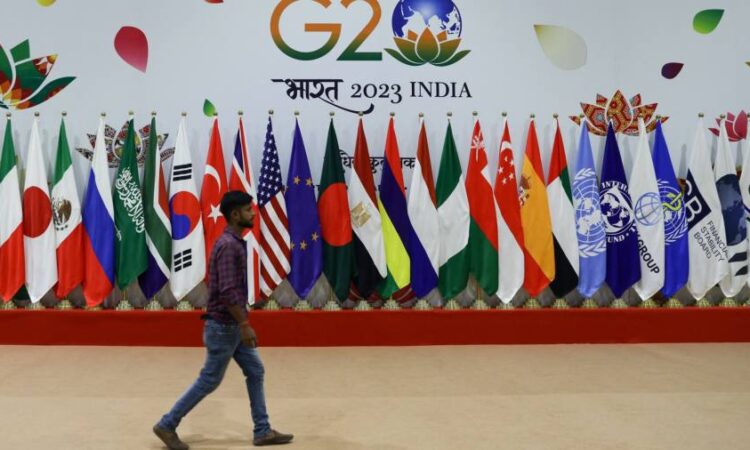
Receive free G20 updates
We’ll send you a myFT Daily Digest email rounding up the latest G20 news every morning.
China challenged the planned US presidency of the G20 in 2026, according to officials briefed on the discussions, in a move that underscores the deep sense of mistrust between Beijing and Washington.
Chinese officials used diplomatic meetings at the G20 summit in New Delhi this week to voice opposition to the US assuming the rotating chairmanship of the group of leading economies, four officials said. The attempt ultimately failed.
The dispute over who will host the G20 in 2026 stoked Sino-American tensions over many issues discussed at the annual gathering of world leaders, including Russia’s war against Ukraine and efforts to combat climate change.
The allocation of the rotating G20 presidency, a role that involves setting the agenda for the group’s discussions that year, chairing ministerial meetings and hosting the leaders’ summit, is typically an uncontroversial process that follows a loose schedule.
But Chinese diplomats called for this year’s G20 summit declaration to delete a reference to the expected US presidency in 2026, according to two people briefed on the private discussions during the drafting process. Western countries, including the UK, opposed the Chinese move, and the phrase was included in the final version adopted by leaders.
“We look forward to meeting again in Brazil in 2024 and in South Africa in 2025, as well as in the United States in 2026 at the beginning of the next cycle,” the joint statement said.
A spokesperson for China was not immediately available for comment on whether it was objecting to the US chairing the G20.
Jake Sullivan, the US national security adviser, told reporters on Saturday: “On the issue of China, all I can say the communique is done, the reference to the United States as the host of 2026 is part of it, and China has agreed that, all of the G20 members have agreed that and we’re gratified by that.”
Officials told the Financial Times that China’s stance had surprised diplomats from other delegations, and had exposed the myriad divisions between the two superpowers. The Chinese arguments against the US were “not G20-related issues”, one of the officials said on condition of anonymity.
The G20 has no permanent secretariat. Brazil will assume the presidency next year with South Africa to follow in 2025. After that, each of the members states will have hosted a summit, meaning a new cycle will commence. The first G20 was held in Washington in 2008.
The US has pitched its 2026 presidency as a sign of its commitment to the grouping, which has been roiled by the geopolitical divisions created by Russia’s war against Ukraine.
“We look forward, ourselves, to hosting the G20 in 2026. And even without Russia’s active participation and the tensions the war has created, I still see the G20 as highly effective,” Janet Yellen, the US treasury secretary, said in New Delhi on Friday.
Chinese president Xi Jinping did not travel to India this weekend, the first time he or any Chinese leader has skipped a G20 summit. But Beijing has insisted it is generally taking a positive approach to the grouping.
Questioned on Friday about whether China’s objections on issues such as Ukraine and climate change were holding up a joint statement from the G20, a foreign ministry spokesperson said Beijing was ready to co-operate with other parties under the principle of “consensus building”.
“The G20 is the premier forum for international economic co-operation. China attaches high importance to and actively participates in G20 activities,” the spokesperson said.
This week China’s spy agency attacked recent diplomatic overtures from the US towards Beijing as mixing engagement with containment, hinting that a possible meeting of Xi and Biden in November in San Francisco will be in jeopardy if Washington does not show more “sincerity”.
Additional reporting by Joe Leahy in Beijing






